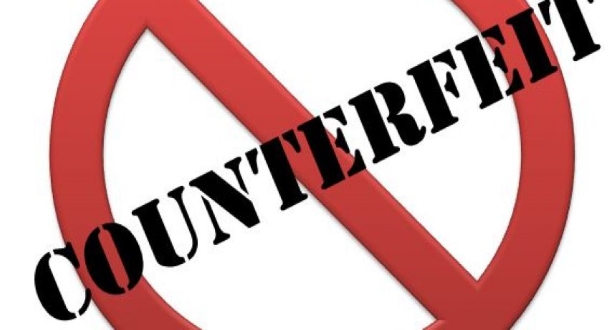E-Business
Nigerian Police, HP Close Down Print Cartridges Counterfeiting Facilities in Major Seizure

Nigerian Police authorities with, the support of HP’s Anti-Counterfeit and Fraud team, have successfully halted three major counterfeiting operations trading illegal HP print cartridges in the Nigerian market.

In July 2021, local Nigerian authorities conducted three major raids on several large-scale counterfeiting premises in the Nasarawa state and the Abuja area. The resulting seizures saw officials confiscate over 5,000 illicit items from various commercial sites, preventing their unlawful sale within Nigeria.
“Counterfeiting is an illegal activity that not only negatively impacts the business of resellers and distributors, but also affects the product experience for our customers. HP Original ink supplies have been developed to consistently deliver high quality results while ensuring minimal impact on the environment” said Emmanuel Asika, Country Head, HP Nigeria.
“We value our longstanding partnership with the Nigerian authorities and the exceptional success of our Anti-Counterfeiting and Fraud Programme in safeguarding our customers from the illegal sale of fraudulent HP products”
Counterfeiting is not only an illegal activity, but it also negatively impacts the businesses of both resellers and distributors. A recent study by the Organisation for European Cooperation and Development (OECD) and the European Union Intellectual Property Office (EUIPO) shows that international trade in counterfeit and pirated goods represents up to 3.3% of world trade, or as much as USD $509 billion.
In the European Union (EU), counterfeit and pirated goods amount to up to 6.8% of imports or as much as EUR €121 billion. The report also notes that counterfeiting causes companies to lose revenue, leading to direct and indirect job losses, in addition to lost revenue for the government.
Although counterfeit cartridges may look like genuine HP cartridges, they do not provide the high print quality, reliability, and yields that customers have come to expect from original HP products.
Instead, using counterfeit cartridges can entail significant risks. These risks can include cartridges which fail prematurely or do not work at all, and even damaged printers due to ink or toner leakages.
Due to their often-poor print quality and necessary re-prints, counterfeits are likely to waste valuable resources such as paper or energy. At the end of life, it is unlikely that counterfeit cartridges are recycled.
By comparison more than 875 million Original HP Ink and Toner Cartridges have been recycled by customers with HP Planet Partners, and more than 4.7 billion recycled plastic bottles have been used by HP to manufacture new Original HP Ink Cartridges.
E-Business
NITDA DG Reaffirms FG Commitment to Responsible and Inclusive AI

The Federal Government of Nigeria has reaffirmed its commitment to building a responsible, inclusive, and sovereign artificial intelligence ecosystem to enable Nigeria to transition from being a passive consumer of AI technologies to an architect and builder of indigenous AI systems.

This was said by the Director General of the National Information Technology Development Agency (NITDA), Kashifu Inuwa Abdullahi CCIE, while delivering a virtual address at the InnovateAI Conference held in Lagos.
The conference brought together policymakers, technology leaders, innovators, and stakeholders to discuss the future of artificial intelligence and its role in driving Nigeria’s digital economy and national development agenda.
Inuwa outlined Nigeria’s ambition to transition from being a consumer of artificial intelligence technologies to becoming a builder and owner of AI systems that reflect national values and priorities, in line with the National AI Strategy.
“Our goal is not just to use AI, but to architect and build our own AI systems in Nigeria,” he said, stressing that the country must take ownership of its AI future.
He noted that Nigeria’s approach to artificial intelligence extends beyond innovation to include governance, infrastructure, data sovereignty, and policy evolution.
According to him, “Responsible AI is never a finished job; it is an iterative journey. Our policies must evolve as the technology evolves, and we must avoid frozen laws by adopting living policies that adapt over time.”
He cited the implementation of the Digital Economy and E-Governance Bill as a key mechanism for generating insights that will help refine AI regulations and governance frameworks.
Inuwa also highlighted the challenge of data representation in global AI systems, noting that most models are trained on non-African datasets, which often results in bias against local dialects, cultures, and demographics.
“If a model shows bias against a local dialect or demographic, we cannot just patch it. We must reinvest in infrastructure to retrain it with inclusive and representative local datasets,” he stated.
He added that building national AI infrastructure is critical to achieving data sovereignty and ensuring that Nigeria is not merely an end user of foreign AI systems.
He further called for strategic partnerships with global technology companies and hyperscalers to build AI infrastructure in Nigeria while aligning with local values and national priorities.
“The world today is a global village. We need to work with global players, but they must understand our local nuances and help us build the infrastructure to retrain and develop AI models that reflect our context,” he said.
The NITDA Director General explained that adopting a comprehensive AI lifecycle approach, from responsible data collection and governance to deployment and continuous feedback, will enable Nigeria to move from reacting to AI developments to proactively designing indigenous AI systems.
“Without understanding how AI models are trained, how decisions are made, and how models are retrained, it will be difficult to build a responsible and trustworthy AI system,” he warned.
He reaffirmed that the Federal Government is intentional about promoting responsible AI and is working closely with the technology ecosystem to co-design national AI guardrails. He described platforms such as the InnovateAI Conference and other national AI dialogues as critical to shaping Nigeria’s AI future.
E-Business
Mutual Benefits Assurance Settles ₦5.9bn Claims in January 2026

Mutual Benefits Assurance, a leading Nigerian insurance company, has paid a total of ₦5,937,665,353.57 in claims to policyholders in January 2026 alone, underlining its strong financial capacity and unwavering commitment to prompt claims settlement.

Mutual Benefits Assurance
A breakdown of the figures shows that ₦3,426,602,834.28 was paid under its General (Non-Life) Insurance portfolio, while ₦2,511,062,519.29 was paid across its Life businesses, including Group Life and Retail Life policies.
The significant payout within a single month reinforces Mutual Benefits’ reputation as a dependable insurer that honors its obligations swiftly and responsibly.
Commenting on the development, Olufemi Asenuga, Managing Director, Mutual Benefits Assurance Plc stated that claims settlement remains the core promise of insurance and the ultimate test of an insurer’s credibility.
“Insurance is built on trust. Our ability to settle over ₦5.9 billion in claims in one month demonstrates not only our financial strength, but also our deep commitment to our policyholders. At Mutual Benefits, we do not just sell policies. We stand by our promises,” he said.
With over three decades of operations, Mutual Benefits has consistently positioned itself as a strong and well-capitalised insurer.
The company operates both Life and General Insurance businesses and remains fully compliant with regulatory capital requirements as stipulated by the National Insurance Commission (NAICOM).
The January payout reflects Mutual Benefit’s robust underwriting standards, prudent risk management practices and efficient claims administration framework.
It also aligns with the company’s broader record of substantial claims settlement in recent years, reinforcing its standing as a trusted brand in the Nigerian insurance industry.
Mutual Benefits employs over 5,000 staff, managed by seasoned management team and an experienced Board of Directors. Industry observers note that prompt claims payment remains one of the most critical differentiators in Nigeria’s competitive insurance landscape.
By consistently settling valid claims without delay, Mutual Benefits continues to strengthen customer confidence, deepen market trust and expand its footprint across retail and corporate segments.
As the company begins 2026 on a strong footing, it reiterates its commitment to innovation, service excellence and delivering value to policyholders and stakeholders alike. Mutual Benefits Assurance focused on its mission to provide reliable risk protection solutions while maintaining the highest standards of professionalism and integrity.
E-Business
NITDA Warns Nigerians of Actively Exploited Microsoft Office Vulnerability

National Information Technology Development Agency (NITDA) has issued an urgent cybersecurity warning about a serious Microsoft Office vulnerability (CVE-2026-21509) that attackers are actively exploiting.

This advisory, shared through Nigeria’s Computer Emergency Response Team (CERRT.NG), highlights the risks of this flaw and recommends immediate action to protect systems.
Microsoft has released quick security updates to fix this vulnerability, which has a severity score of 7.8, showing it is a serious risk. Attackers have already used it in targeted attacks.
CVE-2026-21509 affects multiple versions of Microsoft Office, including Office 2016, Office 2019, Microsoft 365 Apps, Office 2021, and later versions.
This flaw allows attackers to bypass security features meant to stop harmful Object Linking and Embedding (OLE) controls. OLE is an older Microsoft technology that can be used to embed links or content, but it has often been exploited by malware.
By exploiting this flaw, attackers can create specially designed Office documents.
When a user opens these documents, they can run malicious code or gain further access to the system.
Exploitation requires user interaction, meaning attackers often trick people into opening harmful Word, Excel, or other Office documents. Common methods include using email attachments or files from untrusted sources.
Because Microsoft confirmed that the vulnerability is being actively exploited, they have made emergency security updates available outside their usual schedule. Users and organisations should:
- Install the latest Microsoft Office security updates for all affected versions.
- Restart Office applications for Office 2021 and later to ensure that the updates take effect.
- Use registry-based settings for protection if updates can’t be applied right away.
- Follow good cybersecurity practices, like using endpoint protection and filtering emails.
Microsoft’s updates for Office 2021 and newer versions are automatically applied, but need a restart of the applications to be active.

 E-Financial3 days ago
E-Financial3 days agoEcobank Nigeria Fully Repays $300m Eurobond Notes

 E-Financial2 days ago
E-Financial2 days agoACAMB Educates Content Creator to Curb Misinformation on Bank Recapitalisation

 E-Financial3 days ago
E-Financial3 days agoZenith Bank Warns Public Over Fake Jim Ovia Investment Videos

 Telecom2 days ago
Telecom2 days agoBanks, Telcos Settle Four-Year Dispute over N300Bn USSD Debt

 General News2 days ago
General News2 days agoPalmPay Unveils First Batch of Winners in #LoveWithPalmPay Campaign

 E-Business3 days ago
E-Business3 days agoChams Carves Out Subsidiary to Support Africa’s Digital Transformation

 E-Financial3 days ago
E-Financial3 days agoBoI Secures CBN’s Approval for Non-interest Banking Operation

 E-Financial2 days ago
E-Financial2 days agoFirstCap MD says Payment Security Remains Biggest Barrier to Bankable Gas and Power Projects


























